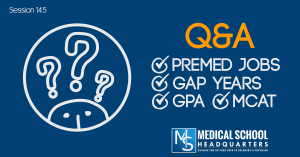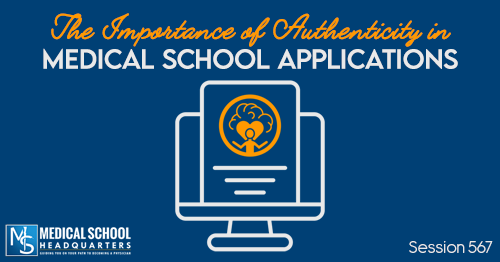Apple Podcasts | Google Podcasts

Session 145
I recently hosted a chat over at blab.im and hung out with around 11 people, where I was answering premed questions. I decided to release them here for you all to take the information you need to help you in your medical school journey.
Watch the video here:
Questions from a foreign physician with a U.S. green card
Q: Beside MCAT scores, what additional materials, such as letters of recommendation, need to be prepared for a medical school application?
A: Everything! (letters of recommendation, personal statement, extracurricular activities)
Q: Do DO medical schools require volunteer experience as well as MD medical schools? Can my clinical experience in another country be counted as clinical experience?
A: You can count it. But get more experience in the U.S. because your clinical experience in a different health care system isn’t as relevant.
Q: I have a Bachelor’s degree and a Master’s degree in clinical medicine. Am I eligible to apply to a DO school?
A: Every DO school is going to be different with what they require. So read the College Information Book and find out what they want.
Q: GPA of 3.0—is it high enough to apply to medical school?
A: Yes. The higher the GPA, the better, of course.
Q: What subjects does the MCAT cover?
A: Go to the AAMC’s website, and check it out from there.
What If I Have a Low GPA and Want to Go to Medical School?
A: You can retake your prerequisite classes, but understand that your grades for those classes will either be averaged on the MD application or replaced with the newer grade for the DO application. (Update: DO schools no longer do grade replacement!)
The other option is to take a postbac that will enhance your grade. Or get a Master’s to show that you can handle the higher level sciences; its GPA will show up separately on your transcript.
What Should I Do to Prepare for Medical School?
Q: What other things should I be doing aside from my job to prepare for medical school?
A: You need shadowing experience to know what life is like as a physician. If you take the DO route, most schools highly suggest having letters of recommendation from an osteopathic physician. So if you’re applying to a DO school, seek out an osteopathic physician to shadow.
Should I Study MCAT Review Books Alongside My Classes?
Q: Should you study for the MCAT side by side with your classes?
A: It’s not a bad idea, but the MCAT is so different from the materials you’re taking in your classes. Don’t worry about studying for the MCAT at this point, and instead focus on acing you’re coursework and getting used to college.
Deferring from Medical School for a Year
Q: My sister thinks I should apply to medical school as a junior in college. But I’m thinking about taking an extra year to beef up my application and do better on the MCAT. What is your view on this? If I apply this year, I might want to defer a year before I start. My reason for deferring would be to start a family, and maybe traveling or doing something I won’t be able to do for quite a while.
A: If you defer, you need to have a good reason for why you’re doing it. But if you do apply this year and defer, think about how prepared you are to take the MCAT. Do you have enough time to do your letters of recommendation, personal statement, and get the applications in on time? Also, the school that you get an acceptance from doesn’t have to agree to defer you for a year, so you run that risk.
[Related episode: What Does the Med School Application Timeline Look Like?]
If you defer, you need to have a good reason for why you're doing it.Click To TweetQ: An admissions board said that the majority of those they accept are re-applicants. Should he apply for the sake of being a re-applicant next time?
A: No, it’s a highly grueling and defeating process, so it’s not something you look forward to doing twice. Don’t apply just to apply.
What Should You Do for Your Gap Year as a Premed?
Q: What do you do to find a job for a gap year?
A: No formula for that. Just do something that will pay the bills. Do something you’ll enjoy, and if it’s not related to medicine, make sure that you’re still volunteering and staying plugged in with the health care side of things. You can marry the two by being a scribe because you get paid while getting patient care experience.
Q: How far back can experiences be that you put in your application?
A: There’s a general rule not to put things that were back in high school if you didn’t continue it after that. But if it’s a life-changing experience, put it on there. You have 15 spots in your application for extracurricular activities, but you don’t have to fill up all 15.
[Related episode: 5 Common Mistakes Premeds Make with Extracurriculars]
Is It Okay to Take Two Gap Years Before Medical School?
Q: Is it a good idea to take two gap years?
A: It’s a fabulous idea. Taking gap years is highly recommended. The more time you’re spending being away from being a student, the more you’re able to understand your patients and build rapport with them.
What If I Have No Time for Volunteering?
A: The goal is to show the admissions committee that you’re able to put others before yourself.
Q: When volunteering or shadowing, is it better to have a scheduled basis or to do it all in one week like on a trip or at a camp?
A: It’s the quality of the experience, not quantity. It’s not just something you put on your application, but you’re there to experience something of impact you can write about, and maybe to get a letter of recommendation from somebody.
Q: Can you get a letter of recommendation if your volunteering is not medically related?
A: If you can get a stellar recommendation from somebody—even if they’re not a physician, but they can speak to your qualities as a human being and possible qualities as a physician—then get the letter. It doesn’t hurt.
LSU School of Medicine’s 32-Hour Policy
This was interesting to hear about. I didn’t know about this policy at the LSU School of Medicine:
“This policy allows for an applicant to obtain 32 or more post-baccalaureate hours of coursework in biology, chemistry, physics or mathematics. The admissions committee would then consider the GPA for those 32 or more hours to be that applicant’s GPA for the medical school application process. This policy allows for those applicants to distance themselves from a weaker undergraduate GPA which may otherwise hinder them from gaining acceptance into our medical school.”
What Should I Do During My Summers as a Premed?
Q: What’s a good thing to do during the summer?
A: Enjoy your summers. Go shadow or volunteer, but just enjoy.
How Much Physics Do I Need to Apply to Medical School?
Q: How much physics do I need?
A: For undergrad, you need a year in physics with lab for most schools. Always keep an eye out on the College Information Book for the DO schools and the MSAR for the allopathic schools.
Other questions answered…
Q: What is a good way of highlighting 8 years as an EMT with increasing levels of leadership?
A: When filling out your application, show what you did and the impact that you had on others in the process.
Q: Is there a job experience part included in the application?
A: The extracurricular activities include all activities from paid work to non-paid work, hospital, non-healthcare related, everything!
Q: What about those saying that something in my application is not true health care experience?
A: Read the application instructions for a specific breakdown of what each section is.
Q: Is being an EMT and the likes looked on as too traditional? Or should you find another job?
A: Do whatever it is that you feel drawn to do. Make sure it’s something you’re enjoying.
Links and Other Resources
- For more premed Q&A, check out my podcast Ask Dr. Gray: Premed Q&A.
- Related episode: What Kind of Job Should I Get Before Applying to Medical School?
- Related episode: Taking a Gap Year Before Medical School: Should You Do It?
- Need MCAT Prep? Save on tutoring, classes, and full-length practice tests by using promo code “MSHQ” for 10% off Next Step full-length practice tests or “MSHQTOC” for $50 off MCAT tutoring or the Next Step MCAT Course at Blueprint MCAT (formerly Next Step Test Prep)!











